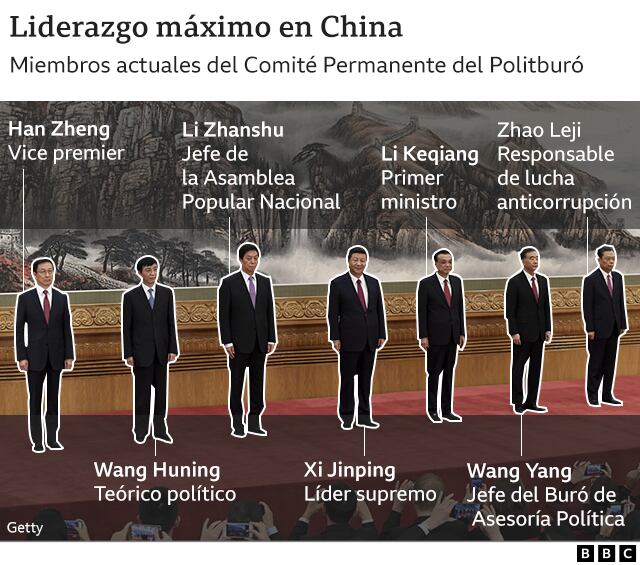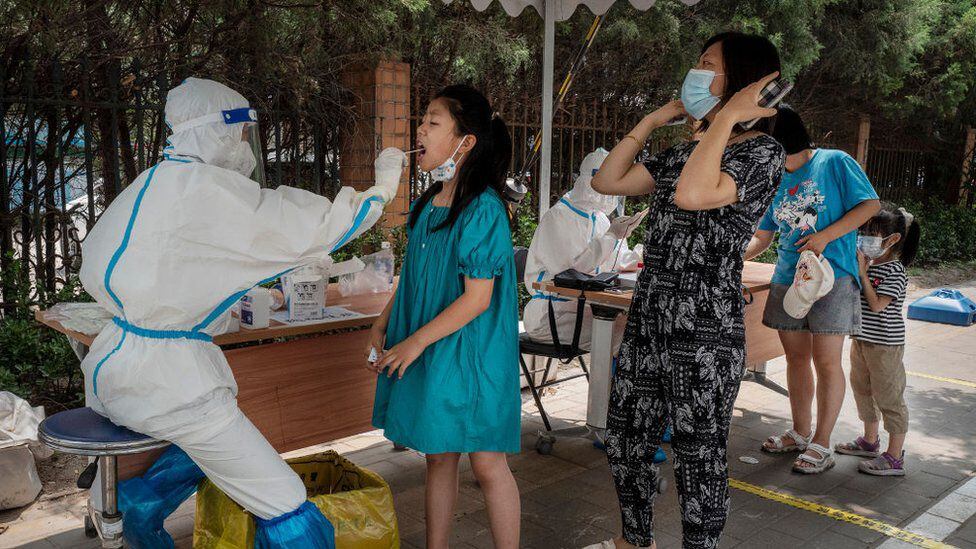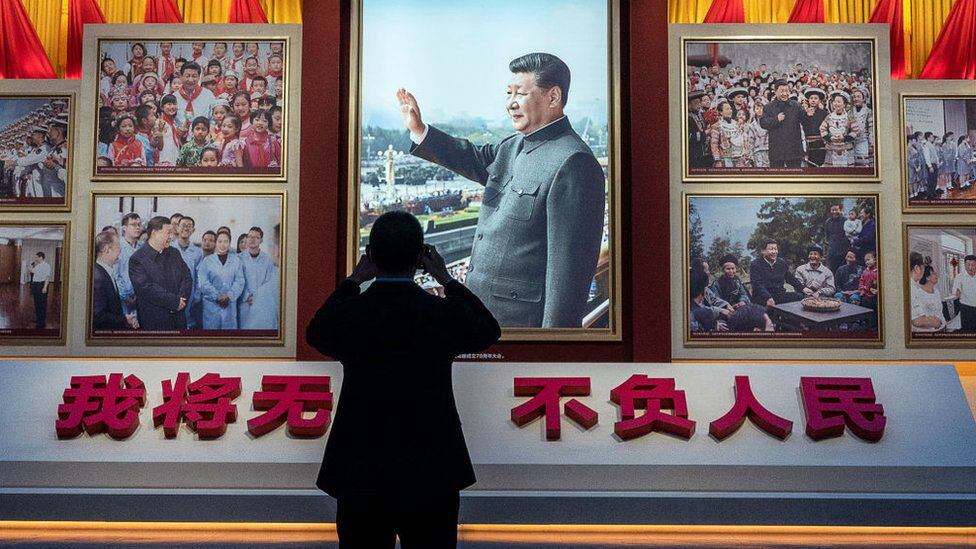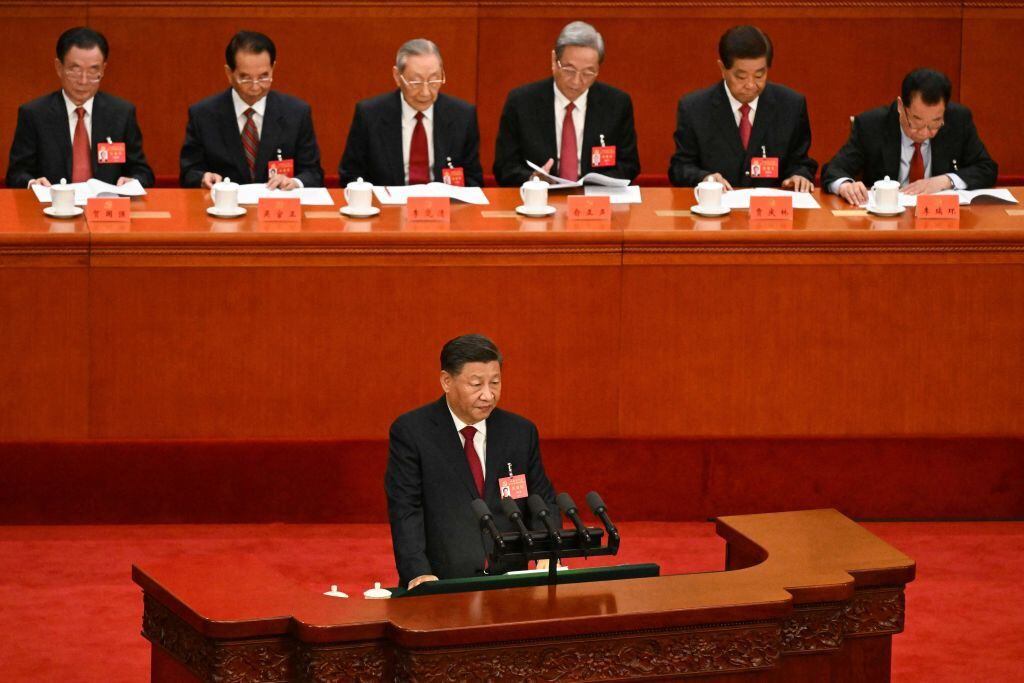Experts anticipate that it will be a kind of coronation.
This October 16, the Communist Party of China (CCP) begins its 20th Congress, one of the most important meetings in the history of training.
LOOK: Xi Jinping, the man who lived in a cave and became the leader of China, the second most powerful president in the world
In it, it is expected Xi Jinping receive a third five-year term and thus establish himself as probably the most powerful Chinese leader since Mao Zedong in the 1970s.
His rise comes after the constitutional reform of 2018, in which the limit of two terms that existed to hold the presidency of the country was abolished, thus opening the possibility that Xi, 69 years old, remain in power for the rest of your life.
That norm that existed since 1982 limited the power of Xi, who is, at the same time, secretary general of the PCCh, head of state and president of the Central Military Commission of China, for which he directs the Armed Forces of the country.
But not anymore.
During his 10 years in power, Xi has tightened the Communist Party’s grip on all aspects of life in the country and cemented China’s position as a global economic and military power.
Paradoxically, when he came to power in 2012, few expected him to become a leader without internal checks and balances. in the CCP; in fact, it was thought that he would be a reformist and conciliatory leader.
“He is not going to be a dominant leader like Deng (Xiaoping) or Mao (Zedong). He is going to have to create consensus among the Party leadership,” American journalist and academic Sidney Rittenberg told the BBC at the time.
It was not so. In retrospect, many experts attribute these misperceptions to the fact that Xi is the son of a historical CCP leader who was reformist, whose footsteps he was thought to follow, and to the fact that the current president he was fairly discreet about his ideas as he rose through the party hierarchy.
“The two decades that preceded Xi, under Jiang Zeming and Hu Jintao, were decades of collective leadership, consensus, you might even say lowest common denominator, and that period spawned tremendous corruption, factionalism and bad decision-making. Xi Jinping was expected to follow that tradition,” Daniel Russell, who was assistant secretary for Asia under Barack Obama, told the BBC.
“It is ironic that, as a political actor, Xi religiously and carefully followed Deng Xiaoping’s advice to ‘hide the force and bide your time.’ when he came to power, he proved not to be the reformer people might have hoped for and it certainly didn’t demonstrate the kind of continuity that was anticipated,” he added.
But how did Xi become China’s most powerful leader in decades?
consolidating power
Soon after coming to power, it became clear that Xi was moving away from China’s model of collective leadership and establishing himself as the main source of the country’s decisions, Russell noted.
“He bypassed and undermined the traditional bureaucratic mechanisms of the state, government ministries, etc.., and began to create what they called leadership groups. Groups, with Xi Jinping as chairman, for all important issues and that somehow replaced the work of the government and heaped decision-making in the hands of the party and specifically Xi Jinping,” he stated.
At the same time, Russell noted that Xi has reduced the number of top officials at the top of the top decision-making body, the CPC Standing Committee (which is made up of only seven people), and launched an anti-corruption campaign whose real goals went beyond punish this scourge.
“It was not a campaign for 100 days, as is traditional in China. Nor for six months or perhaps a year, to eliminate the most heinous criminals. It was a mechanism to systematically strengthen his personal power, purging his enemies and creating an atmosphere of fear at the highest levels of the party structure, while at the same time gaining the trust of the population,” says the former US assistant secretary for Asia.
Steve Tsang, director of the China Institute at the University of London, sees this anti-corruption operation as pivotal for Xi.
“That operation has been absolutely vital to consolidating his power and position,” Tsang told the BBC.

Tsang affirms that this operation had a double function, since in addition to fighting corruption it was a campaign to ratify the party.
“Putting those two sides together, Xi could use the campaign to get out of the way all the top party officials who weren’t following his political line or weren’t useful to him in other ways,” he said.
“Thus, he was able to consolidate power and, within 5 years, changed the operating system of the Communist Party of China without changing its structure,” he added.
economy and society
Beyond politics, during his tenure Xi has also consolidated his power over the country by reducing the autonomy of even the most powerful Chinese private companies and subjecting them to the designs of the state, which in some cases has caused them great losses.

This led to a reduction in the participation of the private sector among the largest companies in the country for the first time in 7 years.
According to the specialized economic environment Bloomberg, at the end of 2021, of the 100 most valuable companies by market capitalization, 49 were private, down from 53 in 2020.
The strict regulations imposed by Beijing on sectors such as the internet, real estate and education led to the loss of US$1.5 trillion in the value of the stocks of these companies.
At the same time, and using its covid-zero policy, the Xi government has managed to increase to unseen degrees the control of the government over the lives of citizens.
Now, thanks to the fact that citizens must be constantly registering their presence through appsthe State can know precisely and in real time what each person is doing.
Lucy Hornby, a visiting scholar at the Fairbanks Center for China Studies at Harvard University and a veteran former correspondent for the Financial Times in China, is critical of these measures taken by the Xi government during the pandemic.
“They bought some time, but they didn’t use it well. They used that time to create a surveillance state, instead of using it to develop vaccines and immunity within their own society.“, Hornby told the program real story from the BBC.
A society that favors the strong leader
But while Xi’s concentration of power is viewed critically in the West, perceptions within Chinese society vary.

Thus, for example, although the fight against corruption has helped Xi to rid himself of political adversaries, it is about a cause that has support among the citizens.
On the other hand, as Hornby explained, there are many Chinese who consider it important that there is one person who has the last word on issues.
“There is a big tendency, especially in single-party states, to want to have a single point of decision-making. And, of course, all the propaganda of the Communist Party for 70 years has always been about having a monolithic party structureso I think people accept it because that’s the way it is,” he added.
Victor Gao, an academic at the Center for China and Globalization, a Beijing-based think tank, believes the leadership of Xi has been favorable to his country.
“China has never been as united as it is now and this is partly due to the fact that for the past 10 years Xi Jinping has exercised strong leadership within the Chinese Communist Party, among the Chinese military, as well as in the Chinese government and among the population,” Gao told the BBC.
“His fight against corruption in the CCP, among the Chinese military, in the government, and in state-owned enterprises has really changed the way things are done in China,” he said.
Challenges of concentration of power
But the concentration of power does not mean that the problems to be solved disappear and Xi faces a few challenges both internal and external.
Steve Fang points out that for nearly a quarter of a century after the fall of the communist bloc in Europe, the CCP has managed not to make a serious mistake that could destabilize China’s politics, society, or economy.
“But that happened because collective leadership allowed for a stable expansion of the scope of closed-door debates among top leadership. Xi Jinping changed that in 5 years and had basically turned it into an echo chamber for when he became the strongman in 2017,” he said.
“Since then, we have a series of policies that are very problematic: the trade war with the United States, the covid-zero policy, the crackdown in Hong Kong, the crackdown in Xinjiang, the support for Russia in the war against Ukraine and the measures against the most important companies in the private sector, in the most innovative area of the Chinese economy in the technology and fintech. Those are Xi Jinping’s policies because he is no longer listening to anyone else,” he added.
Fang claims that Xi sold the covid-zero policy as a show of superiority of the Chinese system, at a time when Western societies were badly hit by the disease and under quarantine, while China was more open until the arrival of the variant. omicron

“The situation has completely changed. Xi simply cannot admit to having made a mistake and so China sticks with the covid-zero policyeven though there are many people in the Communist Party who have realized that this policy is wrong and very unpopular in China at the moment,” he said.
Daniel Russell, for his part, believes that having so much power in his hands could eventually turn against Xi.
“If you are in charge of absolutely everything, sooner or later you are going to be held accountable for things that go wrong. And when you look at all the problems that China is currently facing, one wonders if the coronation of Xi Jinping, the 20th Party Congress , may be the zenith of his power“, he stated.
In fact, a few days before the start of the Congress, these important challenges were made evident with an unusual protest in the heart of Beijing: a large banner that read “No to covid tests. No to the Cultural Revolution I want reforms. Not lockdowns, I want freedom. Not leaders, I want to vote. I will not be a slave, I will be a citizen.”
The claim, which was quickly censored by the authorities, went further, urging society to go directly against the leader, whom he branded as a “traitor dictator.”
This story is adapted from the BBC’s Real Story radio show, which you can listen to here: Xi Jinping’s plan for China
Source: Elcomercio
I, Ronald Payne, am a journalist and author who dedicated his life to telling the stories that need to be said. I have over 7 years of experience as a reporter and editor, covering everything from politics to business to crime.

:quality(75)/cloudfront-us-east-1.images.arcpublishing.com/elcomercio/GIYDANJNGEYC2MJWKQYDAORSGA.png)


:quality(75)/cloudfront-us-east-1.images.arcpublishing.com/elcomercio/PMKHT4WGTZAFLJ3QDDF54MJYLY.jpg)
:quality(75)/cloudfront-us-east-1.images.arcpublishing.com/elcomercio/GHFNYZVCQFHUTO3LUQOLLP7YC4.jpg)
:quality(75)/cloudfront-us-east-1.images.arcpublishing.com/elcomercio/G3B5S3YP7JEQFMKVBHIUDLT4OQ.jpg)
